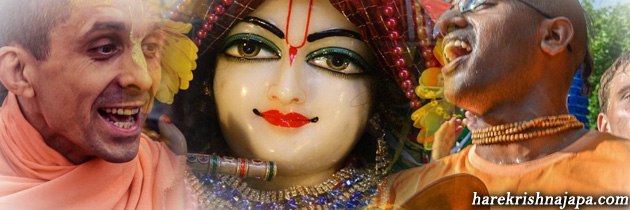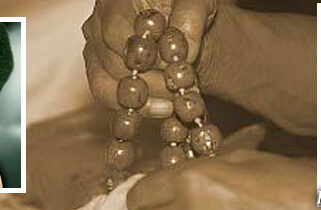What are the offenses to be avoided while chanting Japa?

The sincere devotee who wants to attain a perfection (Siddhi) for himself by the process of chanting the Name of the Lord must refrain from the ten kinds of offences which are quoted below from the “Padmapuranam.”
1. The first and foremost offence is the act of defaming the great saints who have glorified the chanting of the Name of the Lord by example in their own life and precepts. According to ordinary moral principles no one must be defamed for serving any ulterior motive. But still according to the gravity of different offences, defamation of Saints who have done much for the propagation of the Name of God and His Fame must be considered the gravest of all offences. Those who are therefore accustomed to defame such saints, are spiritually great offenders and such persons can have no access to the transcendental Name of the Lord. We should therefore be guard against such offence.
2. The second offence is to place the Absolute Godhead or Vishnu Tattwa in the category of the demigods who derive their powers from the Supreme Lord. The Supreme Lord is one without a second and all other gods are His servitors, having no separate existence as another Almighty Godhead. These subordinate gods are stated in the Geeta as “Anya devata” i.e., gods other than Myself (Shree Krishna)
Jepyanya devata bhakta jajante shradhyannita
Teopi mam eba Kounteya jajantee avidi purbakam
This abidhipurbakam means unduly or with offensives. The Supreme Godhead is Shree Krishna undoubtedly and this is confirmed in all the scriptures and specially in the Brahma Samhita as follows:–
Iswara parama Krishna sachchitananda vigraha
Anadiradi Govinda Sarbakarana karanam.
i.e., Shree Krishna is the primeval Lord and Origin of everything. He is the cause of all causes. He is the Summum Bonum Absolute Godhead. The Plenary Manifestations of Shree Krishna are manifold such as Rama, Nrisingha, Vishnu etc. But all such manifestations are Absolute knowledge. No one is therefore equal or greater than the Absolute Knowledge. This subject is itself a matter of studies by transcendentalists but without knowing the intricacy of the Absolute knowledge, those who simply imagine that the Absolute Godhead and subordinate demigods are one and the same commit great offence at the feet of the Supreme Lord. The subordinate gods such as Shiva, Brahma, Ganesh, Surya, Indra, Chandra, Varuna, Vaue etc., are either qualitative incarnations of the Absolute Godhead or in other cases Jiva souls with delegated powers from the Personality of Godhead. Neither existence of the demigods shall be misconceived nor they should be made one and the same with the Absolute Personality of Godhead. Those who want to attain perfection in the way of chanting the Names of the Lord must refrain from such conglomeration of facts in the spiritual science.
3. The third offence is disregard of the Spiritual Master. The devotee must receive the transcendental Name of the Lord from the transcendental lips of a bonafide spiritual master who is cent percent devotee of the Lord and nothing more or nothing less and then begin chanting the transcendental Name of the Lord by constant repetition. Such spiritual master as above mentioned is known as the Guru from whom either initiation is taken or the one from whom spiritual instruction is received. One should have unflinching faith in such self realised transcendental spiritual master. The bonafides of such spiritual master can however be known, by their activities only which are always evident in respect of everything being done for and on behalf of the Lord. The self-realised spiritual master never deviates from the rulings of Shastras (Law Books) and he always does in practice what he speaks in theory. Those who however manufacture spiritual lessons from their own fertile brain, without having undergone any spiritual training from a bonafide spiritual master, cannot be counted as a spiritual master. Disrespect for such bonafide spiritual master and respect for the pseudo-spiritual master both are offences of the third order.
4. The fourth offence is defamation of the standard scriptures such as the four Vedas, Upanishads, Puranas, Brahmasutras, Ramayana, Mahabharata, Geeta, or other literatures which conform to the principles of the above mentioned scriptures. In the Geeta Shree Krishna Himself accepts ‘Brahmasutras’ or ‘Vedanta Darshan’ as the standard of all spiritual knowledge.
“Brahmasutrapadaschaiba Hetumatvinischitam”
In the spiritual society no sect or Sampradaya is considered as bonafide party who has no authorised interpretation of the Brahmasutras. (Interpretation of “Brahmasutra” by the party represented by Lord Chaitanya is known as “Govinda Vashya” of Acharya Baladeva Vidyabhusan). Those who therefore invent some spiritual party without knowing the Brahmasutra from an authorised spiritual master or do interpret without proper reason and philosophy, do simply create disturbances in the spiritual line without doing any benefit to himself or to his unfortunate followers. Shreela Rupa Goswami describes such unauthorised activities as follows:–
Sruti Smriti Puranadi Pancharatrabidhin bina
Aikantiki Harerbhakti utpataiba kalpate.
Pseudo-devotional activities without reference to the standard scriptures as above mentioned, are simply acts of disturbances in the name of spirituality. The performer of Sankirtan must refrain from such disturbing elements.
5. The fifth offence is to misunderstand the glorification of the transcendental Name of the Lord as exaggerated facts. Actually by the chanting of the transcendental Name of the Lord, all gains be it material or spiritual are automatically obtained. It is simply a question of time that takes for the fructification of the desired result. But those who think, without attaining to perfection, that such results are exaggeration of facts, do commit offence of the fifth order. The performer of Sankirtan must refrain from such misrepresentation of facts.
6. The sixth offence is to manufacture concocted or designed meanings of the Names of Hari (The Lord) or that of the scriptural truths. One can directly understand that the word ‘Hari’ means the Personality of Godhead Who is Eternal Bliss, Eternal Knowledge, and Eternal Form but without knowing the intricacy of the Lord’s form etc., those who think ‘Hari’ means the Impersonal Brahman do commit offence of the sixth order. There are others who are still less intelligent and do manufacture meanings of the word “Shree Krishna” as the mind (?) Rama as satisfaction and similar other things. Such manufacturers of distorted meanings do not generally take what is direct and spontaneous interpretation but they always try to enforce indirect interpretations for their own temporary benefit only. They are also great offenders and the performer of Sankirtan must carefully take leave of them.
7. The seventh offence is to indulge in vices on the strength of chanting the Name of the Lord. Those who are really recipient of the transcendental Name of the Lord from the transcendental sources, and those who chant the Name of the Lord very carefully without any offence as above mentioned, cannot naturally indulge in vices as a matter of course. But for the reason of that those who intentionally commit vices knowing that they are always with the Lord (?),–are the greatest of all offenders and their counteracting endeavours for the vices committed during the day time, by the chanting of the Name of the Lord, in the evening, cannot be accepted as Sankirtan at any cost. One should always guard himself against such pseudo-spiritual devices for the well being of one’s ownself as well as one’s followers. This sort of offences can be compared with the act of pouring water on the fire while it is burning. Water pouring and burning of the fire cannot go together.
8. The eighth offence is to equalise the value of all good works with the chanting of the transcendental Name of the Lord. Penances, austerity, meditation, fasting, methodism, morality or such goodness that lead the performer to higher stations of life, cannot be equalised with Shree Krishna Sankirtan. Those who do like that, are also offenders at the feet of the transcendental Name. The results of all the above mentioned good works are after all material in nature because they can offer in return material prosperities only and are therefore limited within time and space. But the transcendental Name of the Lord and the Lord Himself are non-different. As such realisation of the Absolute Truth cannot be compared with relative goodness. The performer of Sankirtan must be on his guard against commitment of offence of the eighth order.
9. The ninth offence is to preach and advise of the transcendental nature of the Name of Lord to such a person who is atheistic in temperament, mundane moralists, and addicted to elevatory process only. Unless one has cleansed his heart from such contaminations, he can hardly be eligible for receiving the transcendental Name of the Lord.
There are many professional spiritual masters whose business is to sell the transcendental Name of the Lord (?) and these traders generally sell to persons who are altogether unfit. Such business transactions on considerations of s s. d. exchanged between the spiritual master and the so-called disciple are undoubtedly great offences. The student of Sankirtan must refrain from the association of such pseudo-spiritualists in order to achieve perfection in the process of Sankirtan.
10. The tenth and the last but not the least offence to the lotus feet of the transcendental Name of the Lord is either to become inattentive to all the above offences or not to take to the chanting of the transcendental Name of the Lord in spite of hearing all the glories of the system.
A serious student of Sankirtan can get rid of all the above offences if he desires so, knowing well the different forms of offences and by refraining from them by all possible precautions. This can however be done without difficulty by continuous chanting of the Name of the Lord and for such constant reciter of the transcendental name of the Lord, there is no room for committing such offences.
In conclusion we may add that without culture nothing can be made to perfection. The culture of the science of Sankirtan is Shree Krishna Himself, both being non-different. In mundane matters only the means and the end are different from one another. But in the transcendence the means and the end are non-different. In preparatory stage only, for chanting the Name of the Lord, there is every chance for committing the above offences but for the reason of that we must not be disheartened at the least. We should always remember that both the preparatory stage and the perfection stage of Sankirtan is nothing but Sankirtan. The difference of these two stages are realisation and non-realisation only.
– “The Science of Congregational Chanting of the Name of the Lord” Back To Godhead, 1944





